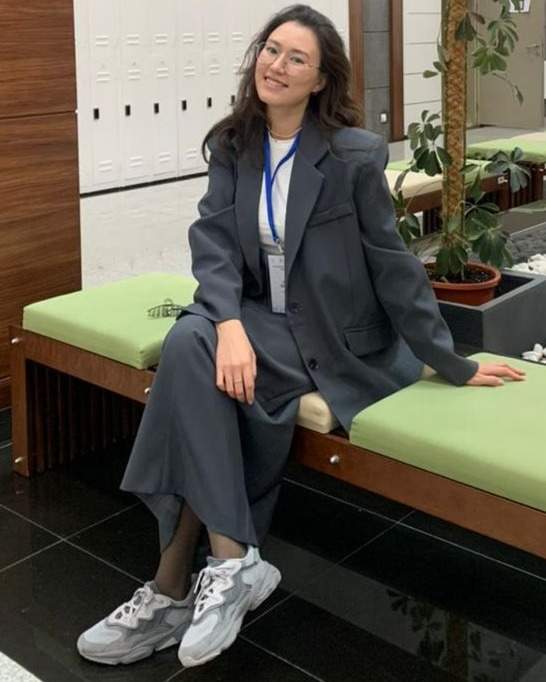New generation in education: what do they bring to the learning table?

The successful future of the nation starts from the first steps of a child towards knowledge. People in the educational system play the most important part in building up new generations of students and young citizens. However, as the time progresses, the new generation comes to the education. Young, bright and just recently students themselves: what do they bring to educational system? To better understand the future of education, it is important to pay attention to the present day educators, especially the new generation coming into the field with new view and ideas, Kazinform News Agency correspondent reports.
Tell us about yourself and your path to education? How long have you been teaching?
My name is Zhibek, and my students call me Zhibek ұстаз. I’m from Pavlodar but currently working as an English teacher at Quantum STEM School in Astana. I am a KIMEP University alumni, graduating with a Bachelor's in Arts of Two Foreign Languages. Besides, I’m pursuing my master's in Multilingual Education at Nazarbayev University. I used to always be an A+ student at school, driven to earn a scholarship at university and further enroll in the exchange program. It was my goal since the 9th grade that motivated me to prepare hard for the UNT and IELTS exams. Initially, I had always refused the idea of becoming a teacher at school. I wanted to enhance my skills in management and administration. However, after enrolling in my bachelor's in foreign languages, my perspective on educational facilities changed. I became engaged with teaching methodology courses and designs as well as studying languages. By the way, I was a former Olympiad participant in the French language, and I chose German as a third foreign language to study at university. So, I can say that I have some knowledge of French and German, apart from English, Russian, and Kazakh. Thus, I chose my career to be as a foreign language educator and further became interested in other languages' education management and curriculum design.

What are your thoughts on the differences between educational system and education nowadays and in the past?
Well, having taught for about three years now, I can compare it from both my student and teacher perspectives. I would say that the main difference lies in teachers' professional awareness and student-centered learning classrooms. I studied in a lyceum that highly focused on Olympiads, UNT scores results, and scholarships, which required us to study hard. It was a strict but respected school because of its achievements. Some of the lessons were completely teacher-centered, resembling lectures. Despite having access to interactive boards, teachers weren’t interested in using them. We only had access to the board sometimes, especially when someone from outside the school visited. Today, I notice more digitally literate teachers and even more professional courses available. Classrooms are more learner-centered, and many teachers use tools to engage the class and deliver the subject interactively.’
What is your personal goal as an educator? Do you have ideas on possible changes?
I certainly want to contribute to better education for all people in Kazakhstan. Observing the facilities that private schools provide from my own experience and the professionalism of their teaching staff inspires me to integrate similar practices into all Kazakhstani schools, both public and private. Education should be interesting, motivating, and accessible for all. Given my expertise in technology and digital education, I aspire to raise other educators’ digital awareness to foster more engaging and interactive learner-centered classrooms. As the students are highly engaged in the classroom and motivated to expand their knowledge they learn best.
In your opinion, how can we, as a nation, be better regarding the educational system and how can our educational system itself be better?
In my opinion, education is the cornerstone of any nation. It is essential to enhance its quality and accessibility. While there might be access to education, there is a lack of awareness of these opportunities. Policies tend to be top-down, resulting in a gap between government views on policy development and the needs of teachers, students, and administrators. We need to listen to each other, involve practitioners in policy development, and develop education policies collaboratively.
How can we attract more young people to education?
Based on my experience, it is invaluable to support young educators. I was hired by one of the most supportive and experienced trainers, Bostan Hayat. I always remember her saying that you can always refuse, but you need to try. I'm currently in my second year of teaching in the department under her guidance, which comprises highly qualified professionals, including CELTA teachers, masters’ graduates, having more than 7 years of teaching who are always willing to support and help me. Despite teaching for 30 hours and undergoing CELTA course last year, I succeed by passing it because of their support. Furthermore, my head always involves me in interesting projects and provides opportunities for development by offering teacher training, facilitating competitions, and encouraging participation in research conferences. This year, the administration supported me with a flexible schedule as I pursued my master's. In summary, I am grateful to be able to work in such a supportive and professional environment. There are always people who are willing to help, whether by listening or praising your hard work, as we often forget to praise ourselves.
I think the interest in the teaching career needs to be increased. We tend to avoid the opportunities in teaching careers and usually graduates enrolling in pedagogy and philology tend to leave their career after or even during their education at university. There is a low interest in choosing the career of teaching. We need to promote its value and enhance teachers’ motivation to consider professional development as education is a tool to increase the number of specialists in different fields.
The new generation is not involved in the teaching exclusively, but in the management processes too. Education processes are heavily involved with paper work and documentation, and since teaching ways are progressing, educational management progresses likewise.
My name is Tomiris. I'm 21 and I'm from Kyzylorda, Kazakhstan, but now I live in Astana. As of right now, I work as the CEO of a EdUnity project, but my path to education started a long time ago when I was 16 years old. I first got back from United States and started working as the English language teacher. I realized that when you have the freedom and ability to make education interesting, it could really be helpful and entertaining to learn something. I also realized, I actually love educational sphere and then worked as the Russian language teacher for foreigners.

What is the uniqueness of you project EdUnity? What was the inspiration behind it?
The uniqueness of the project lies in the fact that, firstly, there is no such project on the CIS market at all. There are a lot of different solutions that do one thing, for example, take into account working hours, or are responsible for accounting, or are responsible for electronic document and turnover. But at the same time, as a project manager, I understand that business is an ecosystem and all these things can't work separately from each other. And when a company buys several different solutions from different suppliers, there is still no transparency. We wanted to create such an ecosystem of school management, in which everything will be in one place, and which will allow the department to communicate qualitatively with each other and optimize work. Plus, in general, there are no solutions in the market of Kazakhstan, tailored specifically for the educational sphere. Therefore, our idea was just to create the right solution, uniform for the market of Kazakhstan, for our schools, in order to make their work more efficient and give them the opportunity to engage in education. What's the inspiration behind it? Well, in general, we always seem to be responsible for organizing processes and automating what can be automated, because robots are, let's say, programs, they should help us, and not be to our detriment. So why not use them? And here, as it were, such two passions have developed. This is the organization of processes plus education. They came together. And that's why the project is called that. EdUnity: Education and Unity.’
What can you say about the difference in educational systems in the past and today?
As for the education system in the past and now, I want to say that it was very high-quality then, since our parents really received and still carry a lot of knowledge. But, it seems to me, then there was education for the sake of education, that is, the very fact of having knowledge that you are good was important you know mathematics, that you know geography well. At the same time, now I see how modern schools are introducing a lot of new techniques. For example, the same project-based learning, when you understand that you can make a project out of any problem, understand how it can be solved. It’s all organized, eco-friendly to do. We are also introducing financial education. They began to study a lot about ecology and teach children about it. That is, now in schools children are being prepared more for real adult life and, I think, they are given a lot of relevant knowledge that they will really need. Therefore, I think that the differences are such, they are moving in the right direction, in the right direction.
How do you see your goal for the future and a person in educational management and educational field as a whole?
My main goal, probably, is to continue to look for opportunities for innovation in education and to help Kazakhstani schools open or continue to develop in an environmentally friendly way, so as not to harm children, nor the owners opening schools or the environment and sustainable development. For example, by means of QR codes. This is literally one piece of paper for the whole school. Also, as part of the electronic document turnover, we are reducing all this printed bureaucracy and the waste of paper, the use of this paper. Electronic signatures too. Therefore, I would probably like all sorts of interesting innovative solutions in the educational field, namely in Kazakhstan, to continue to develop.
As a nation, we can make our education better if we look at what problems there really are in Kazakhstan. Namely, studying the detailed statistics of existing problems and understand how this may be related to future generations, with their education. Then, give them exactly the skills and knowledge that will help them make our country a better place in the future and minimize or completely eliminate these problems. In order to attract more young people to education, first of all, conservatism must be eradicated, because this is probably the main obstacle to the implementation of various ideas. The second point is to show them that education is not only about teachers and the classroom, it is much broader and much more interesting. Give support to young people and their initiatives, to show the state that they exist and that they need their support. And fourth, it's probably to make self-education more interesting. Moreover, give children more freedom. Freedom of imagination, some kind of decisions, self-made opportunities. Because we have such an idea in education now that conservatism is equal to security. But the more we give children freedom of action, the more liberated, free, initiative people they will grow up to be and be able to implement some of their projects that will help them in their lives, in their careers, in the future.

